| Srl | Item |
| 1 |
ID:
144114
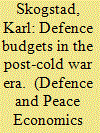

|
|
|
|
|
| Summary/Abstract |
This paper examines the determinants of national defence budgets in the post-Cold War era employing a spatial econometric framework. Using data for 124 countries over a 16-year time period, I examine spatial relationships in defence spending to investigate how countries account for the military spending of other countries when setting their budgets. Using specially developed weighting matrices, the regression results indicate that defence budgets are positively spatially correlated. These results provide support for the use of ‘external’ factors when examining defence budgets over this time period. The importance of a country’s spatial location when setting its budget is further examined through the identification of regions of high and low defence spending.
|
|
|
|
|
|
|
|
|
|
|
|
|
|
|
|
| 2 |
ID:
072663
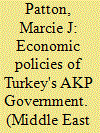

|
|
|
|
|
| Publication |
2006.
|
| Summary/Abstract |
How can we account for the priority that Turkey's "Islam-sensitive" government has placed on adhering to the IMF's prescriptions for macroeconomic stability and fiscal restraint in lieu of its electoral promises to pursue a justice-oriented social agenda and aggressively tackle problems of poverty and unemployment? In this article this question is answered by analyzing the challenges posed by international factors (debt sustainability, pressures by the IMF and the EU), as well as domestic factors (the Justice and Development Party's (AKP) own unpreparedness, oppositional tactics by the secularist establishment) that have shaped the AKP government's economic policies.
|
|
|
|
|
|
|
|
|
|
|
|
|
|
|
|
| 3 |
ID:
142140
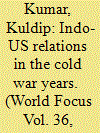

|
|
|
|
|
| Summary/Abstract |
International relations are largely based upon the interplay of conflict and cooperation between and among nations. Every set of relationship is affected by several external factors. Therefore, domestic, regional as well global factors must be considered in analyzing relationship between any two countries. As for Indo-US relations, since days of its freedom struggle Indian leaders were inspired by the American Declaration of Independence and aspired for the American ideas of progress and democracy. The United States, itself a colony of Britain at one time, supported India’s freedom movement to some extent, despite the World War II, which required closed cooperation between Washington and London.
|
|
|
|
|
|
|
|
|
|
|
|
|
|
|
|
| 4 |
ID:
131455
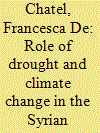

|
|
|
|
|
| Publication |
2014.
|
| Summary/Abstract |
This article examines the role of drought and climate change as triggers of the Syrian uprising that started in March 2011. It frames the 2006-10 drought that struck north-eastern Syria in the context of rapid economic liberalization and long-standing resource mismanagement, and shows that the humanitarian crisis of the late 2000s largely predated the drought period. It argues that focusing on external factors like drought and climate change in the context of the Syrian uprising is counterproductive as it diverts attention from more fundamental political and economic motives behind the protests and shifts responsibility away from the Syrian government.
|
|
|
|
|
|
|
|
|
|
|
|
|
|
|
|
| 5 |
ID:
188645
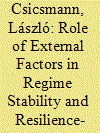

|
|
|
|
|
| Summary/Abstract |
This article aims to bring together the factors of resilience, regime stability, and foreign penetration into one research project based on the example of the Hashemite Kingdom of Jordan, which marked the one-hundredth anniversary of its statehood in 2021. Even though it exists in a neighborhood that is in turmoil, the Jordanian monarchy has managed to survive all the spillover effects from such regional conflicts. This study argues that external influences have played an increasingly significant role in political developments in Jordan since the beginning of the New World Order in 1989. Scholars of international relations often argue that foreign penetration may cause state vacuums like those that have arisen in Syria, Libya, Yemen, and Iraq. Yet, this has not been the case with other states in the Middle East. One important factor behind this resilience and regime stability is related to the behavior of foreign actors. With respect to the Hashemite Kingdom, the United States has historically been the main provider of state security. Nonetheless, at the same time the European Union (EU) has adopted a pragmatic view toward Jordan and its new resilience-building approach also helps to maintain the status quo. Moreover, the regional hegemons and swing states of the Middle East and North Africa (MENA) region do not have an interest in altering the existing order save for a few radical groups. The author argues that the convergence of the national interests of the major regional stakeholders also contributes to regime stability and that outside support has increased the resilience of its political system despite the growing frustrations of many of the country’s citizens.
|
|
|
|
|
|
|
|
|
|
|
|
|
|
|
|
| 6 |
ID:
129673
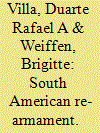

|
|
|
|
|
| Publication |
2014.
|
| Summary/Abstract |
Since the year 2000, several South American countries strongly invested in armaments. At the same time, they increasingly resorted to diplomacy and cooperative institutions to maintain peace. This paper establishes a nexus between motivations for re-armament and recent debates on regional security governance and the emergence of regional powers. Most traditional theories have considered armament to be a function of either the perception of external threat or the availability of economic means. In contrast, this article contends that the rise in arms spending cannot be understood without taking into consideration: (a) the coexistence of a stable power balance, security community thinking and practices in regional security governance; and (b) the desire of emerging states to increase their regional or global roles. This analysis emphasizes non-conflict-driven external motives for military procurement as a new and vital determinant, largely neglected in previous research on the region's military spending. Case studies of three major South American spenders, Brazil, Chile and Venezuela, underscore the significance of non-conflict-driven external factors in military procurement. Their experience shows how emergence of regional powers has the potential to offset the contradictions between conventional security logics, as the tendency of states to purchase arms for non-conflict-related reasons equally supports balance of power and security community thinking.
|
|
|
|
|
|
|
|
|
|
|
|
|
|
|
|
| 7 |
ID:
140147
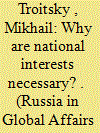

|
|
|
|
|
| Summary/Abstract |
International relations are concerned with national interests and how they evolve. Some researchers insist that there are obligatory and unchangeable interests expressed in terms of power or prosperity. Others suggest reconstructing national interests depending on how a country acts in a particular situation. Still others hold that national interests are relatively stable, but can vary considerably due to external factors, such as emerging or disappearing norms, institutions, or circumstances.
|
|
|
|
|
|
|
|
|
|
|
|
|
|
|
|